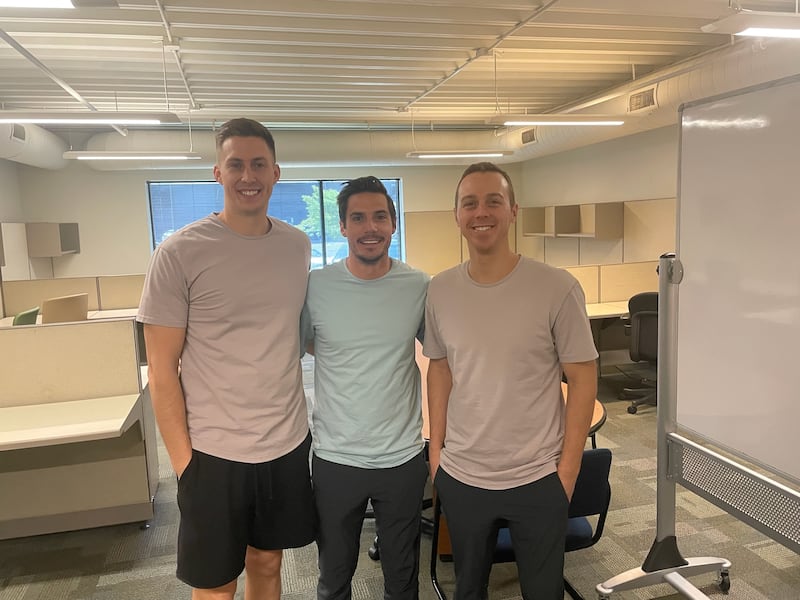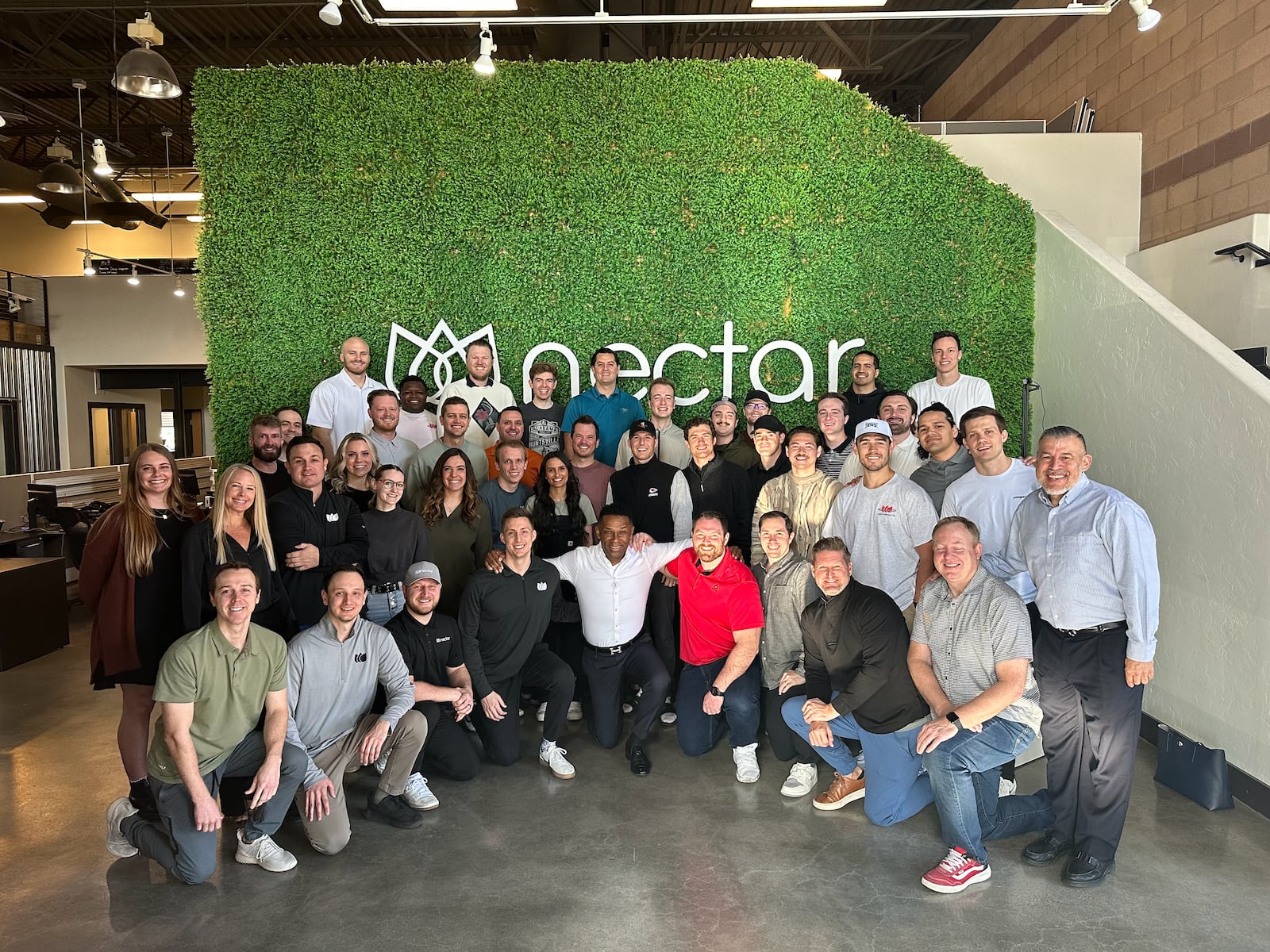It began with side hustles in Mesa, Arizona, where I grew up. I was accustomed to earning money that way since fifth grade. There were duct tape wallets that I’d make and sell in school for five bucks and laser pointers from China, which I also sold. Sometimes, my brother and I spent full Saturdays applying white paint to the bases of citrus trees, taking our little red wagon door to door.
Side hustles were a lot of fun — and they were profitable. When I moved to Utah to attend college, I didn’t know anyone. With just $300 in my bank account, I decided I could make more doing my own thing than getting a job at a call center. Mobile car detailing was something I did for friends back home, and I knew I could earn good money doing it. I decided to give it a go.
It wasn’t a very glamorous beginning. I started knocking on doors in Pleasant Grove. My pitch was that I’d wash for free if they snapped a photo of me next to their car afterward and posted it on social media. I figured it would help get the word out, but unfortunately, no one took me up on it.
Vivint came onto my radar through a friend who worked there. For every eight hours their employees worked, they were awarded a meal card to use at any food truck in the area. She had an extra meal card and invited me to lunch one day. The food truck we visited had a stack of business cards on its counter. One was for a Provo chiropractor who partnered with them; it had a Vivint logo on it with verbiage about an employee discount.
An idea hit me. Maybe I could partner with Vivint as their company’s car detailer. If they promoted my services internally, I could visit them onsite and detail a lot of cars — a real win-win scenario. To me, it was a perfect way to scale a business quickly.
Car detailing and corporate deals
I didn’t need it, but I set up an appointment with that same chiropractor and got my back adjusted. It gave me a chance to ask who his Vivint partner was and how it was going. He said the partnership brought him lots of business, and he was kind enough to share her contact information.
Right away, I sent an email with my pitch: I wanted to be the company’s mobile car detailer, and we’d offer a discount to their employees. They had an intranet page with vendors and restaurants that they partnered with locally. Ideally, I’d be on it. Within an hour, she responded enthusiastically and told me to meet her the following week.
In the meantime, I got a shirt printed with my company logo. I wanted to look legit. When I went to the meeting, we went over the details, and she asked if my work truck had a generator. I said it did. That night, I bought the generator I’d said I had and put it in the back of my 2001 Honda Civic with 200,000+ miles on it. Best work truck ever.
An email was sent to 3,000 Vivint employees announcing my business, Fresh Finish, as its newest perk. As I started getting inundated with phone calls, I knew we were off to the races. Within a week or two, employees at Qualtrics (located just next door) heard about our deal. They wanted me to start detailing their employees’ cars as well, and they quickly became new customers.
Another plot twist
At the time, my company was just me. I started detailing all of Qualtrics co-founder Ryan Smith‘s really cool cars while also cold-emailing all the big local companies — like doTERRA, Overstock.com and Podium — and many said yes. In no time, I was consistently providing detailing for 15-20 companies.
Any chance I got, I’d ask Ryan Smith questions. Qualtrics was making big strides in business, but the software world was foreign to me. I had no clue how it worked, but I must have asked enough questions for him and others there to ask me a great one in return: Why aren’t you working for us? When I asked if that was a job offer, they said it was.
I handed the reins to Andrew Hollis (Nectar’s eventual co-founder) to keep running Fresh Finish’s day-to-day operations. I also started in an entry-level sales role at Qualtrics, cold-calling and setting appointments. Qualtrics blew my mind! I saw how amazing the world of B2B software business was. They had customers worldwide with no need to be on their hands and knees, outside and washing cars.
The company was scalable, the margins were great, the vibe and culture were upbeat, and tons of talented people worked there. A few months after being hired, though, I realized every call I made was helping build Ryan Smith’s dream. I wanted to build my own but didn’t know where to begin.
All at once, I had an idea. Qualtrics and Vivint had pages listing discount perks for their employees. Vendors were constantly reaching out to them to offer exclusive discounts. The problem was that most employees didn’t know they existed. Nobody was in charge of keeping discounts up-to-date or chasing down additional ones. Why not build an application where we could host all the existing discounts, then make them very accessible and easy to redeem?

Chance encounters
When I called Andrew with my idea, he got excited. None of us were technically inclined, but we knew enough to understand you can’t start a software company without that knowledge. Believing it was only a small hurdle, I decided to figure it out myself and enrolled in a coding boot camp. A few months in, I realized it would take years to be proficient enough to build what we wanted.
Instead, we put a few bucks together to find some junior engineers, get a prototype built and begin trying to sell it. I was still a student at Utah Valley University, where there was a lecture series class advertising a student startup competition. The grand prize was a hefty $4,000.
It felt like this was our shot. When we competed against two dozen teams and won the grand prize, it felt like we’d made it. It validated us. We were on the right track.
After we won, the lecture series speaker came running over to us. It was HireVue founder Mark Newman. He’d won the same competition when he was 20 years old and was able to start HireVue with his winnings. Within months, he became our first angel investor. He allowed us to hire a more senior engineer to build everything out, and we started trying to get our first handful of customers. When doTERRA signed on within the first six months after our launch date — easily the biggest deal we’d made thus far — we knew we were on to something.
The power of meaningful recognition
Early on, we realized churn was likely going to be high. We weren’t solving a strong business need; we initially created more of a “good to have” product. Then, customers began asking about gift cards. Managers were buying gift cards for their employees at stores in bulk, then needed to store them away and keep them safe. They were difficult to keep track of. It was a mess.
Another idea hit. We decided that, in addition to perks, we would help automate how rewards are distributed through gift cards. We created a partnership allowing us access to hundreds of gift cards. Organizations could go in, set up a budget, and award their employees a digital gift card to Amazon or Nike — then have all the reporting and tracking done in the same place.
The more we researched the competitive landscape and the outcomes companies were looking for, the more we felt a strong gravitational pull toward the employee recognition category. We wanted to focus on building camaraderie and connection in the workforce, then marry that in some way to rewards automation and reward employees for exceptional work.
Data tells us that two out of three employees feel underappreciated at work. We give most of our waking lives to our jobs and the majority of us don’t feel appreciated for doing so. When we don’t feel appreciated, we don’t feel like we belong. That can bleed into home life and cause stress, mental health issues and so on. As employers, we can do so much better.
Most companies think of distributing rewards in one way: by automating the reward or incentive. It’s more of an extrinsic motivation. We felt strongly that we should begin focusing on the recognition itself and make it more meaningful and frequent. That’s what drives the outcomes businesses are looking for, allowing employees to become hyper-engaged and making them want to stick around. Focusing on recognition leads to better retention. Workforces are more engaged and experience less turnover, which are powerful ROI drivers for any business.
Feeling like you matter at work matters. When I was 16, my dad became disabled, and my mom became the breadwinner at home. With no degree and making almost no money, she worked her way up high into her organization. She was the only woman to be promoted to the leadership team, but there was all kinds of toxicity within the culture and specifically toward her. As men, how do we transform or reshape culture away from that norm? How do we move away from this command-and-control, militant style that’s been around for decades to one that’s more trusting?
Her experience inspired me to work hard at building trust and connections. We’re making sure people are valued and appreciated. When we did our competitive research, we found that most companies in the employee recognition rewards category were enterprise solutions. Our goal shifted to help small businesses and slowly work our way up, which is exactly what we’ve done.
What makes you different?
Nectar almost shouldn’t have happened. The lion’s share of our good results has come from small, seemingly insignificant moments of serendipity.
When I think of the investors who have put money into Nectar and how I met them, 99 times out of 100, the situation shouldn’t have happened. Our founding engineer was discovered by asking a friend if his network knew anyone. Had I not reached out to this friend, who reached out to his friend, the company could have gone a different direction entirely. Some of our investors connected with us at perfect times.
Part of that comes from one of our core values, which is to be different. My mom would tell me a story about me as a three-year-old: We all had assigned seats at the dinner table, where everyone always sat. One day before dinner, I started moving my chair to a new spot. When she asked what I was doing, I just looked up and said, “I be different.” That’s how I’ve rolled my whole life — going against the grain of conventional wisdom and trying to look at situations in more than one way. For better or worse, that’s just how I am. Being different is good.

